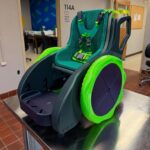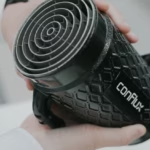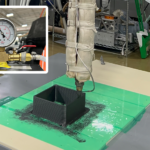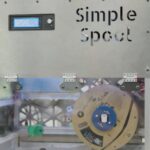Following on the success of their Photon resin printer series, Shenzhen-based printer manufacturer Anycubic has announced that they are launching the next iteration, dubbed the Anycubic Photon Ultra, on Kickstarter. This one has eschewed LCD technology in favor of the latest DLP chip from Texas Instruments, so will offer higher quality prints with a lower energy consumption.
The original Photons have found a large following with both makers and researchers alike due to its low cost, high resolution and compatibility with a wide range of resins.
The latest Photon machine from Anycubic offers all this and a lot more. Let’s take a look at what is on offer.
Benefits of DLP
The Anycubic Photon Ultra features a print volume of 102.4 mm (L) * 57.6 mm (W) * 165mm (H), and thanks to use of their new DLP screen from Texas Instruments, is capable of printing at 720p resolution. Most budget-friendly desktop SLA systems make use of LCD screens, which has a number of downsides compared to DLP systems.
The switch to DLP technology from LCD brings a number of benefits such as: low to no maintenance, extremely high-resolution prints, and much lower power consumption.
DLP printers use a projector that reflects all the light to a pixel via a micromirror, therefore, there is no light convergence, which allows for crisper black/white contrasts. LCD printers converge all the light to a pixel, which can cause bumps and shadows on the edge of models. When displaying thin lines and small-size texts, DLP printers are clearer than LCD printers with purer colors and richer layers, resulting in more delicate texture and sharper corners of models.
For these reasons, a DLP printer with 720p resolution can offer a much higher quality print than a monochrome LCD printer with a 2k or 4k resolution. The 16 x anti-aliasing on the Photon Ultra helps to smooth the edges and corners of prints, which reduces layer lines, also adding to the quality of the print.
Lower Maintenance
LCD screens by nature, degrade over time. They degrade in an even quicker time when using them in 3D printers, where continuous use can lead to LCDs being replaced every 3-5 months.
LCD crystal substrates found in LCD screens degrade under the UV light typically used for resin printing. This is unavoidable, no matter the quality of your LCD screen.
LCD screens are therefore, just like the photopolymer resins they are used to cure, a consumable. And consumables equal expenses. In short, by using the DLP technology, you will be reducing your expenses on consumable items. The Texas Instruments DLP technology does not suffer these same issues because it doesn’t use liquid crystals, and the internal projector enables the printer to be used for more than 20,000 hours. Over that time an average user would save $600 by using the long-life DLP system compared to an LCD-based one.
The Photon Ultra costs less than 500 bucks on Kickstarter, so that’s not a bad saving.
Quieter, Faster, More Efficient
The Photon Ultra operates at 40% light efficiency, which is 15 times higher than the 2.5-3% that LCD printers usually operate at. It uses far less energy and is rated at 12W with an average power consumption of 8.5W. The printer consumes between 0.017 – 0.034 kWh to print a 100mm high model. The lower power consumption equals less heat, which means the Photon Ultra doesn’t need any cooling fans, making it very quiet indeed.
As mentioned earlier in the article, the previous Anycubic Photon models have been popular with researchers due to their compatibility with a wide range of resins. The Photon Ultra has options for adjustable UV power, which enables users to continue to experiment and discover new resin applications.
The latest Photon gets a speed boost as well, with the Photon Ultra being capable of printing at 1.5 seconds per layer. This is compared to LCD printers such as the Anycubic Photon Mono X, whose speed is 1.5 – 2s per layer. The Photon Ultra can print up to 5x faster than more traditional point light source type SLA printing.
Where to get it
Anycubic’s Photon Ultra is launching on Kickstarter on September 14th, 2021, where it will be available for pre-order in a worldwide exclusive. The campaign will run for a duration of one month, where early backers will be able to purchase at the launch price and also avail of other perks and bonuses. The launch price is $399 for the first 100 backers and $499 after that.
It will retail on Amazon for over $599 after the Kickstarter campaign, so head over to their Kickstarter webpage and get your orders in if you would like to take advantage of the early buyer perks, or if you would like to see the full specs of the new DLP system from Anycubic.









